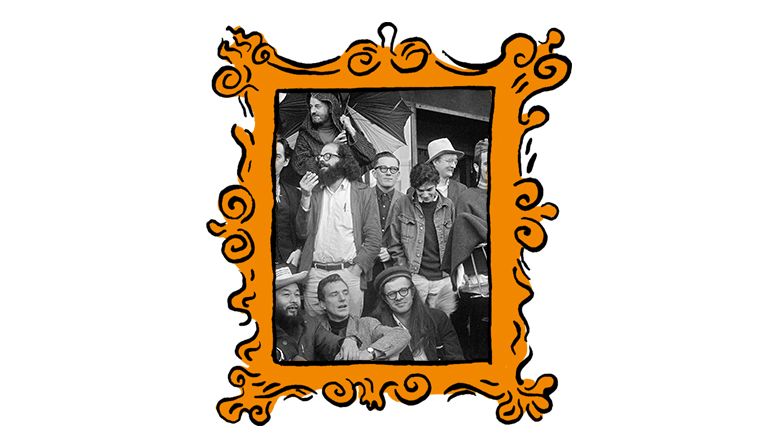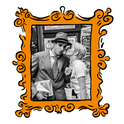In a small, intimate gallery in Fitzrovia, the London Magazine is hosting its first poetry reading. I ambush one of their editors, Jamie Cameron, who is playing—as we say in Greece—the part of village mayor: shaking hands, kissing babies, all before taking to the stage, which consists of a karaoke setup.
There is only one rule: no phones. Not for the audience (or surreptitious journalists) and not for the readers, who were tasked with reciting their poems from memory—a tough sell. “We asked quite a few people [to read]. Not many said yes,” Cameron jokes.
Reading salons like these are nothing new: since as far back as Renaissance Italy, people have gotten together to share and discuss literature. During the Second World War, Caresse Crosby convened the likes of Anaïs Nin, Max Ernst, Henry Miller and Salvador Dalí. The spectacle of a public reading also has its roots in the Beat generation, who were known to narrate aloud in cafés, bars and galleries.
Yet now, as if out of nowhere, they are firmly back in fashion. “Starting a reading series in 2025 is like starting a podcast in 2020,” Cameron says. “There are so many of them, and you have to be intentional with what you’re doing.” Some have been known to attract up to 500 people; others are scheduled as often as three times a week.
It all started in New York during the pandemic, when a group of writers—known as the “Dimes Square” writers—began staging theatrical productions and readings in their living rooms. Once restrictions were lifted, these began to crystallise into regular, in-person events, most famously in a townhouse run by Beckett Rosset, son of Barney Rosset, who fought obscenity laws to publish Henry Miller’s Tropic of Cancer. Nick Dove, an NYC-based writer and photographer, tells me the events hadn’t even “hit a year” before they were taking place every week and inspiring spinoffs. “You could smoke cigarettes inside. It was like going back in time. Everyone was artistically dressed, it was so classic,” Dove says.
Now the trend has a firm foothold in London, with each iteration offering its own distinct flavour. There is the London Magazine series, with its focus on poetry. There’s New Papers, which offers classical musical interpolations. Then there’s Salon Obscura, where I spotted a woman wearing nipple tassels walking a man on a leash, who, in turn, was wearing a gimp-suit (this at the infamous members’ only Groucho Club). Some have attracted big names to read, like Geoff Dyer, Ben Pester and Xiaolu Guo; sometimes publishers and agents have even been spotted in the crowds.
Most organisers don’t point to a single reason for the appeal of their reading series. “People are desperate for a craft, and to showcase their work in some way,” says Dove. “Smart people want to hang out, hook up and party as much as anyone,” says Tom Willis, the organiser of the high-profile Soho Reading Series. (Willis spent time in New York’s reading scene before launching his own.) Saskia Vogel, co-editor of the Erotic Review (which hosts its own regular salons) believes that people simply crave offline interaction.
I have attended many of these readings myself; I have even, I must confess, read at one of them. I was put on earlier in the night, ahead of more established names in “the scene” (including Dimes Square author Honor Levy). People were inattentive as I read, chatting and walking in and out. I discovered afterwards that my reading was the only one to be omitted from a subsequent blog writeup. When I joked about it with the author of the blog, they implied it was because I was not well-known enough. All the same, I enjoyed sharing what I’d written. There is a sense that to perform is to take yourself seriously as a writer, and there were some people who were genuinely interested in my work.
But despite the implicit promise these events give to emerging writers, it seems unlikely that participating in them will lead to a book deal. “The majority of the people who are actually established in the literary and media world look down on a lot of this shit,” Dove says. One agent at the London Magazine event confided to me that they were on the lookout for good writers at these readings—but that they were few and far between.
Which leaves us with the reading series as a phenomenon in and of itself: if they are both something more than just a trendy party but less than a hotbed for new literature, then what are they really doing?
Opt-in, regular social events with faces that eventually become familiar are naturally appealing for residents of big cities, where loneliness is rife. But perhaps there is now a feeling that going to the pub just isn’t enough. Readings are then reflective of a hyper-productive culture wherein recreational time should be spent expanding your horizons—instead of staying at home and watching TV, or even just hanging out with friends, you’re engaging with “the culture”. On a secondary level, you also get to enter “the scene”, something heavily referred to at many of these events, without a hint of irony.
That tells us something about our current social stratification, but a lot less about the state of literature. But this, perhaps, is by design: “I literally do not care about the readings 90 per cent of the time,” as Olivia Allen—Vogue writer and reading series organiser—told me. And so it seems that even at events dedicated to its promotion, with all that socialising, partying and networking built around it, that literature remains—as it always was—at the periphery.
Too cool for literature
Reading groups are springing up in London’s galleries, clubs and bars. But what really are they for?
November 13, 2025












